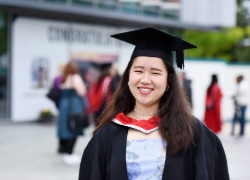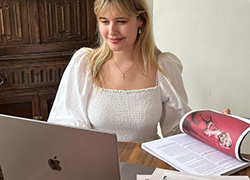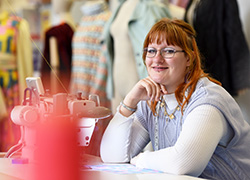Course overview
School of Arts & Creative Industries
See what it's like to study at our School of Arts & Creative Industries.
You develop your portfolio in in Fashion Design or Fashion Communication, giving you the flexibility to focus on your creative passion. You learn about the fashion business with a focus on design, marketing, promotion, image creation and styling skills. You will gain the opportunity to engage directly with the industry through internships, live projects, and collaborations and develop the skills to launch your own business, learning skills in fashion entrepreneurship.
Fashion is a rapidly changing global industry with new digital tools transforming design and making processes and addressing issues of sustainability. This course prepares you for a versatile career in fashion. Your own creativity, ideas and self-expression is placed at the heart of your learning and our team help nurture and guide your interests so that you graduate with a distinctive creative style and voice.
Your degree concludes with a showcase event and fashion show, where you present your creative work to industry, highlighting the skills and expertise you've developed throughout the course.
This course includes a foundation year - ideal if you need additional preparation or if you don't have sufficient grades to join Year 1 of a degree.
Top reasons to study fashion at Teesside University:
- Nationally recognised:
- Fashion is ranked 1st in the UK three years running as part of our Graphic Design subject area ranking. (Guardian University Guide 2026, 2025 and 2024, tees.ac.uk/source)
- Teesside University was ranked 6th for Student Satisfaction for Art & Design in the Complete University Guide 2026. (83 institutions were ranked, tees.ac.uk/source)
- 100% of BA (Hons) Fashion students agreed that they have received sufficient support, advice and guidance in relation to their course. (National Student Survey 2025, tees.ac.uk/source)
- Industry-standard facilities: immerse yourself in our sewing studios, print rooms and technical workshops, where you develop your craft and digital technical skills (2D and 3D), enabling you to create innovative physical and digital garments.
- Get creative: our course and campus are powered by Adobe and Apple. We’re Europe’s first Adobe Creative Campus and the only Apple-accredited University, equipping you with the digital tools and resources to hone your creative skills.
- Industry connections: network with and learn from experienced fashion professionals who contribute to our course, working for brands such as Berghaus, Barbour and Speedo. Gain international experience and broaden your creative horizons visiting or studying abroad with our international partner institutions.
- Work experience: you gain specialised training to thrive in the fashion industry and connect with our extensive network for valuable work experience, employment opportunities, and the development of essential enterprise skills to succeed in your career or launch your own fashion startup.
Creative UK
 Take advantage of our Creative UK membership and help futureproof your career, with networking events, a resource hub to support professional development, and bespoke workshops in partnership with industry leaders and mentors. Sign up for free student membership to get opportunities, events and newsletters sent directly to your inbox.
Take advantage of our Creative UK membership and help futureproof your career, with networking events, a resource hub to support professional development, and bespoke workshops in partnership with industry leaders and mentors. Sign up for free student membership to get opportunities, events and newsletters sent directly to your inbox.
Course details
Course structure
Foundation year core modules
You explore the fundamental principles of design and composition, studying image creation techniques using graphics software. Develop your digital skills and learn how to create form and 3D space, and also incorporate photographic source material.
This is a 20-credit module.
Drawing and Making Fundamentals
Develop your knowledge of fundamental drawing and making approaches for many purposes and disciplines. Through practical drawing workshops, you study measured drawing, scale, composition and perspective, and also the use of colour, materials and expressive mark making. Working alongside a group of your course mates, you create a multi-disciplinary piece based on a brief.
This is a 40-credit module.
Create original ideas and concepts for your individual project, creating an artefact, report, campaign, comic, product or other form related to the arts, design and media industries. You explore the context and history of the creative arts and use this to inform your project. Learning to research and analyse ideas about art, design and media, you develop your understanding of creative working and the relationship between creativity, society and the environment.
This is a 40-credit module.
Develop key study skills in preparation for starting your degree, including critical thinking, teamwork, research and delivering presentations. You are introduced to primary and secondary research sources and shown how to use the virtual learning environment (VLE). You also find out about the wide range of student support and learning resources on campus.
This is a 20-credit module.
Year 1 core modules
Enhance your skills in team-working, communication, project management and negotiation. You collaborate with a group of your course mates to produce a small-scale creative project in response to a subject-specific brief.
This is a 20-credit module.
Introduction to Fashion Practice
Study contemporary fashion practice and its communication to specified audiences and markets through 2D and 3D outputs. Develop skills in the fundamental principles and practices of the fashion industry, embedding the use of the design process to create original fashion related solutions in either digital or physical format. Create an awareness of fashion and promote experimentation through alternative and innovative approaches, while exploring research methods relating to fashion.
This is a 40-credit module.
Introduction to the Creative Industries
With many opportunities in the creative industries sector, learn how to start on your career path while developing vital employability skills such as networking and digital presence. Understand the structure of the sector and the interdisciplinary relationships between art, design and media. Discover how the sector operates locally, nationally and globally – debating the role of policy and the importance of sustainability.
This is a 20-credit module.
Examine contemporary fashion practice through cultural, social and historical studies. Learn about industry processes, working practices, fashion communication and professional visualisation through your own fashion project and digital project portfolio. This includes design development, pattern cutting, garment manufacture and production of a range of fashion samples.
This is a 40-credit module.
Year 2 core modules
Develop critical thinking and analysis skills, exploring contemporary issues and debates related to the creative industries. You research a specific area or development within your chosen subject – this may be technical, economic, ethical, legal, cultural, sociological, or a combination. You draw on appropriate academic and industry sources to contextualise your research. You present your topic and initial research within taught sessions, providing an opportunity for peer and tutor feedback.
This is a 20-credit module.
Develop your technical skills in garment design, patterning and manufacture or your creative skills in journalism, magazine creation, fashion promotion and storytelling. Using industry standard software, you visualise 3D fashion concepts, produce and explore 3D virtual environments and new markets within the industry.
This is a 40-credit module.
You develop and explore, in depth, a creative industry-based project in your specialist area of design, art, media, music, photography or illustration - relevant to your future professional practice. While forming a professional portfolio of work, you experience real-world business scenarios and challenges, industry competitions and cross and inter-disciplinary activities. You gain skills in project management, applied research methods and collaborative creative work.
This is a 40-credit module.
Working in the Creative Industries
There are many challenges facing contemporary art, design and media practices. You research the social, political or ecological challenges around us to generate a small-scale project. You develop and reflect on your understanding of enterprise in the context of the creative industries. Contextualise your own professional practice and aspirations through application of critical thinking and problem-solving skills.
This is a 20-credit module.
Optional work placement year
You have the option to spend one year in industry learning and developing your skills. We encourage and support you with applying for a placement, job hunting and networking.
You gain experience favoured by graduate recruiters and develop your technical skillset. You also obtain the transferable skills required in any professional environment, including communication, negotiation, teamwork, leadership, organisation, confidence, self-reliance, problem-solving, being able to work under pressure, and commercial awareness.
Many employers view a placement as a year-long interview, therefore placements are increasingly becoming an essential part of an organisation's pre-selection strategy in their graduate recruitment process. Benefits include:
· improved job prospects
· enhanced employment skills and improved career progression opportunities
· a higher starting salary than your full-time counterparts
· a better degree classification
· a richer CV
· a year's salary before completing your degree
· experience of workplace culture
· the opportunity to design and base your final-year project within a working environment.
If you are unable to secure a work placement with an employer, then you simply continue on a course without the work placement.
Final-year core modules
You produce a self-managed, individual extended piece of independent investigation and/or creative production or portfolio of work. Supervised by an academic member of staff, you take responsibility for the planning and execution of the work, including the consideration of associated legal, social, ethical and professional issues. You explore in depth a chosen subject area, demonstrating your ability to analyse, synthesise and creatively apply your learning, showing critical and evaluative skills and professional awareness.
This is a 60-credit module.
Plan and implement your departure from education to your first or new career, or to further study. You continue your creative practice, developing a portfolio and/or extended piece of work which reflects you as a creative. You explore discipline-specific employability strategies, and engage and network with industry to develop key connections.
This is a 60-credit module.
Modules offered may vary.
How you learn
Think, dream and make: learn through doing, with focused studio time for practice-based creative work, allowing you to develop ideas and undertake larger-scale, more ambitious projects.
Develop your creative voice: you are coached to find and grow your creative voice. Collaboration with industry professionals and your peers gives you new perspectives on developing your practice.
Grow resilience: develop a creative journal, capturing your challenges, milestones and reflections to see patterns in your thinking and linking reoccurring ideas. You learn how to test ideas, explore creative directions, understand pitching etiquette and develop large-scale projects to help you thrive in the creative industries.
Join the creative sector: our intensive, career-focused modules help you understand working in the arts and creative industries. From industry leaders’ professional wisdom and insight to accessing professional opportunities and creative coaching, you become an industry insider and leave with a working understanding of the professional community.
Become connected: access our network of alumni and practising creatives at Middlesbrough Institute of Modern Art (MIMA). Benefit from supportive voices, specialist expertise, shared wisdom and new ideas, establishing critical relationships that propel you into your creative career.
Get creative: take part in MIMA Creative Week, a festival of workshops where you experiment with new materials, go on field trips and upgrade your tech skills.
Expand your horizons: collaborate with our international partners in Milan and India becoming international creative citizens while developing an understanding of wider global contexts, sustainability and the changing shape of equality and diversity.
How you are assessed
The work produced is the work assessed. There are no exams – producing design projects are a key feature. Assessment is undertaken against carefully defined criteria and project-based assignments involve a critique. The critique is a reflective process allowing for both staff and peer group appraisal.
Our Disability Services team provide an inclusive and empowering learning environment and have specialist staff to support disabled students access any additional tailored resources needed. If you have a specific learning difficulty, mental health condition, autism, sensory impairment, chronic health condition or any other disability please contact a Disability Services as early as possible.
Find out more about our disability services
Find out more about financial support
Find out more about our course related costs
Entry requirements
Entry requirements
Your offer is made on the basis of your UCAS application, your portfolio and, if appropriate, your interview.
Any combination of Level 3 subjects and/or relevant experience will be considered on a case by case basis
Non-EU international students who need a student visa to study in the UK should check our web pages on UKVI-compliant English language requirements. The University also provides pre-sessional English language courses to help you meet the English language requirements.
Helping you meet the entry requirements
We may be able to help you meet the requirements for admission by offering you the opportunity to study one or more Winter or Summer University modules.
Alternative degree with integrated foundation year
If you are unable to achieve the minimum admission requirements for Year 1 entry you could, subject to eligibility, join one of our degree courses with an integrated foundation year.
Direct entry to later years
If you have previously studied at higher education level (for example, a foundation degree, HNC, HND or one or more years at degree level at another institution) you may request direct entry to Year 2 or Year 3 of this degree.
Mature applicants
We welcome applications from mature students (aged over 21) who can demonstrate, through portfolio or written work and relevant experience, that they have developed cognitive and technical skills through their life experiences.
For general information please see our overview of entry requirements.
Are you an international student looking for a foundation course offering both academic and English language content? Explore your options with our International Study Centre.
International applicants can find out what qualifications they need by visiting Your Country.
You can gain considerable knowledge from work, volunteering and life. Under recognition of prior learning (RPL) you may be awarded credit for this which can be credited towards the course you want to study.
Find out more about RPL
Employability
Career opportunities
Many of our graduates go on to work with companies including NET-A-PORTER, YOOX, The Princes Trust, Margaret Howell, Chanel and Pentland, others have gone to set up their own businesses with support from our start-up incubator Launchpad.
Information for international applicants
Qualifications
International applicants - find out what qualifications you need by selecting your country below.
Select your country:
Useful information
Visit our international pages for useful information for non-UK students and applicants.

 Bright future ahead for fashion graduate
Bright future ahead for fashion graduate National acclaim for Teesside academic’s independent publication
National acclaim for Teesside academic’s independent publication Fashion student raising awareness of autism with new collection
Fashion student raising awareness of autism with new collection











